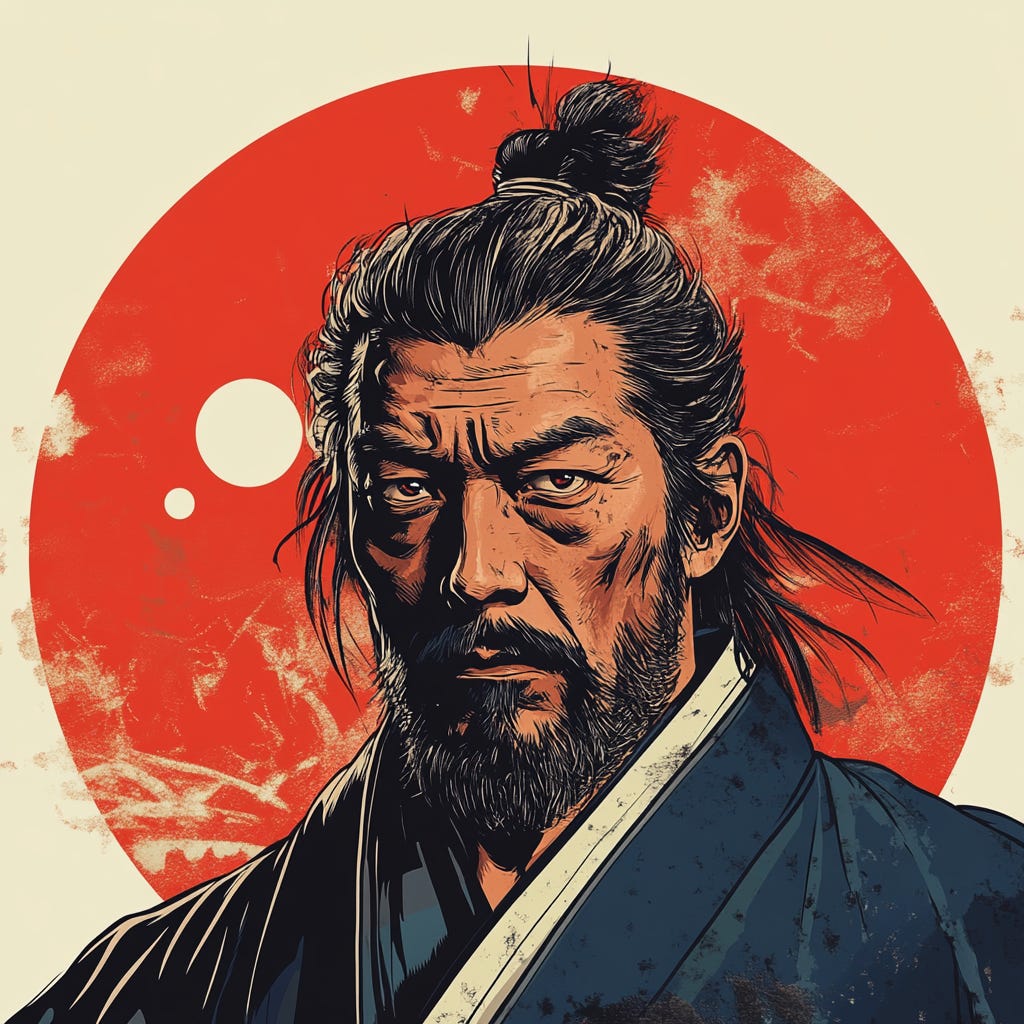The Dokkodo Manual
A 400-Year-Old Guide to Not Sucking at Life
If you're anything like me, you probably spent this morning scrolling through social media while sitting on the toilet, then felt bad about it, then did it again.
Meanwhile, in 1645, a guy named Miyamoto Musashi was writing one of history's most profound philosophical works... while dying.
But before we get into that, we need to talk about this dude
Who Was Miyamoto Musashi?
Picture the most successful person you know.
Now multiply their win rate by about a million, add a sword, and sprinkle in some philosophical genius. That's Musashi.
Here's a quick timeline:
Age 13: Wins first sword fight against a professional adult warrior
Most 13-year-olds: Still figuring out how shoelaces work
Ages 13-30: Fights in 60 duels ( a contest with deadly weapons)
Result: Wins. All of them. Zero losses.
Probability of this happening by chance: LOL
And then, because being undefeated in sword fighting wasn't enough of a flex, he also became:
- A master artist
- A philosophical genius
- The ancient Japanese equivalent of a bestselling author
- Probably really good at time management
But here's where it gets really interesting.
The Last Week Problem
We all have this vague idea that when we're about to die, we'll finally figure everything out and write down some profound wisdom for future generations.
But let's be real - most of us will probably just binge-watch TV and panic about our meds.
Not Musashi. A week before his death, he sat down and wrote the Dokkodo - "The Way of Walking Alone" - 21 principles that basically translate to "How to Not Be a Basic Human."
The 21 Rules are:
Accept everything just the way it is.
Do not seek pleasure for its own sake.
Do not, under any circumstances, depend on a partial feeling.
Think lightly of yourself and deeply of the world.
Be detached from desire your whole life long.
Do not regret what you have done.
Never be jealous.
Never let yourself be saddened by a separation.
Resentment and complaint are appropriate neither for oneself or others.
Do not let yourself be guided by the feeling of lust or love.
In all things have no preferences.
Be indifferent to where you live.
Do not pursue the taste of good food.
Do not hold on to possessions you no longer need.
Do not act following customary beliefs.
Do not collect weapons or practice with weapons beyond what is useful.
Do not fear death.
Do not seek to possess either goods or fiefs for your old age.
Respect Buddha and the gods without counting on their help.
You may abandon your own body but you must preserve your honor.
Never stray from the Way.
Looking at these rules, you might notice something: They're basically the opposite of everything your Instagram feed tells you to do.
While modern self-help is all:
- "Follow your bliss!"
- "Chase your passion!"
- "Live laugh love!"
Musashi is more like:
- "Accept everything as it is"
- "Don't chase pleasure"
- "Stop being so thirsty"
Now, you might be thinking: "Cool story Manoj, but how does this apply to my life where the biggest battle I face is choosing what to watch on Netflix?"
That's where things get interesting.
Let's break down some key rules into modern contexts:
Rule 4: "Think lightly of yourself and deeply of the world"
Modern Translation: Stop taking selfies and read a damn book.
Rule 14: "Do not hold on to possessions you no longer need"
Modern Translation: Marie Kondo was right, but Musashi said it first.
Rule 3: "Do not, under any circumstances, depend on a partial feeling"
Modern Translation: Don't email when you're angry. Just... don't.
The Dokkodo isn't just another self-help manual - it's a challenge. It's Musashi basically saying, "Hey, future humans with your fancy lives and social media addictions, try this if you dare."
And maybe that's exactly what we need: A 400-year-old samurai calling us out on our BS.
And that's it for this week.
Manoj
"1 Idea" delivers interesting insights every week straight to your inbox. If this edition resonated with you, how about sharing it with a friend?
And if you're just diving into my world for the first time, why not hit that subscribe button?



Excellent post. I have shared this with a few colleagues.
Ooooohh love it!! Thanks for the list I am going to read up on the dude and print the list out right away!